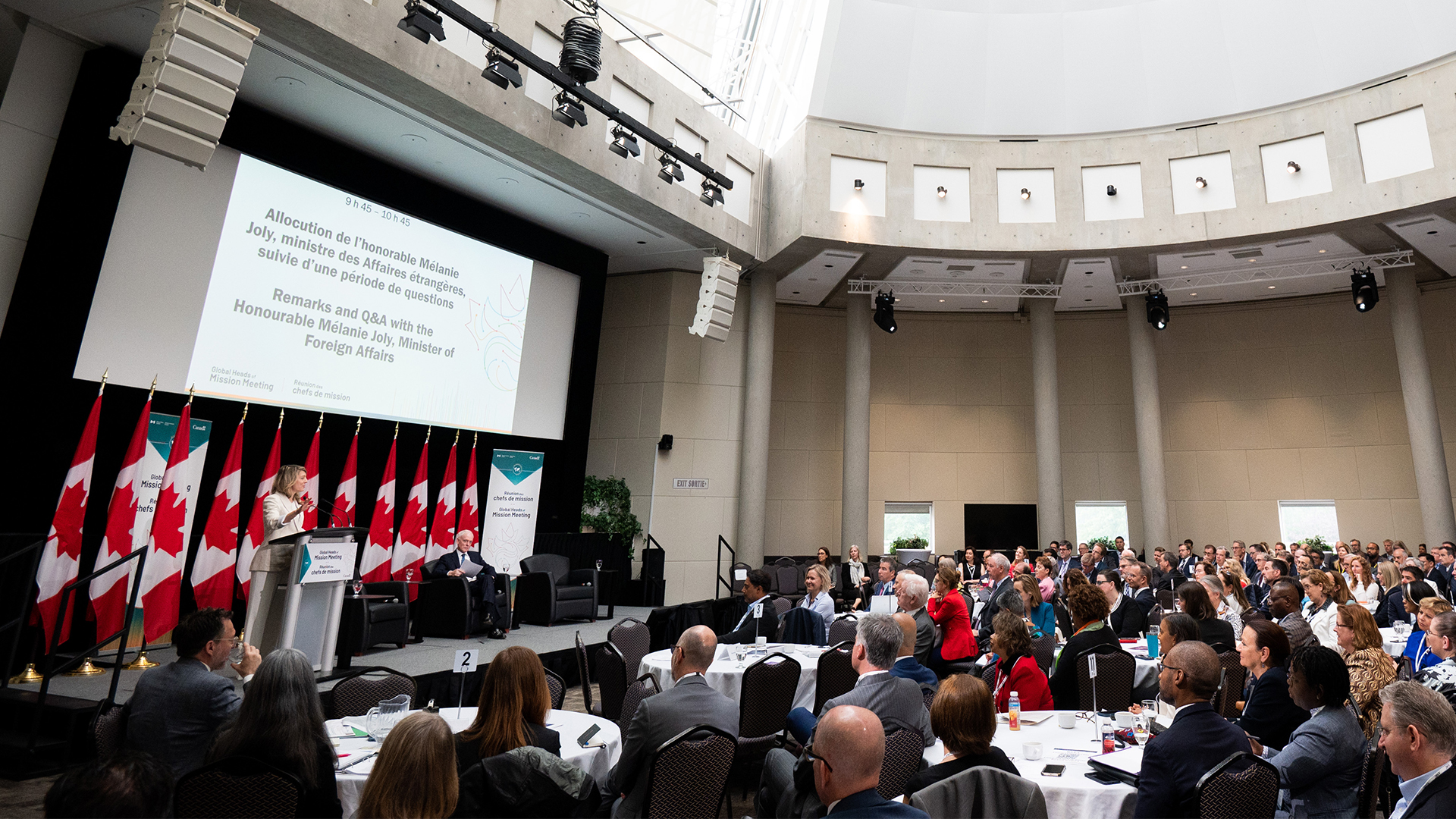
(Version française disponible ici)
Among Canadian foreign-policy watchers, it has become a cliché to say that Canada has lost influence on the world stage. So much so that this reality, which should otherwise be shocking and distressing, has been instead quietly accepted as a fact, even inside “Fort Pearson” (a.k.a. Global Affairs Canada headquarters).
How did we get here? What is at stake? And, most important, why and how we should change course?
For the past 20 years, Canada’s diplomacy has mostly been based on exporting our values. The slogan “the world needs more Canada,” as vain as it sounds, has in fact been at the heart of our approach to international affairs.
Canadians’ worldview has been one shaped by self-comparison. A legacy of middle-power status, our successful immigration program, advancement of social norms, access to quality education, and vast natural resources – bolstered by survey after survey ranking Canada as one the best places to live – have contributed to this inebriation. Successive governments have been all too happy to reinforce and tout these positives and reflect them proudly in terms such as Canada’s feminist foreign policy.
However, starting in the 1990s, the world began re-ordering. Emerging powers such as China strategically positioned themselves for a new post-colonial world previously dominated by the West. The Global South was beginning to affirm itself and seek investment and partners just as the United States and its allies became distracted with the aftermath of 9/11 and the global war on terror. Canada, after notably declining to accompany the United States in Iraq, wholeheartedly followed the Americans into Afghanistan.
Thus began a period of western legitimized regime change. Adhering to the notion of self-defence and protection of civilians, and eager to flex military and diplomatic muscle, the Harper government joined the U.S., France, Britain and others in supporting the Arab Spring movements to topple autocratic leaders such as Khaddafi in Libya. The United Nations gradually added over 40 new members, and the G77 (a coalition of developing countries) grew to 134 countries, wielding a two-thirds majority of the U.N. General Assembly. And China had begun its financial contribution to the group.
What we failed to assess was how these forays were ill-perceived by many nations that might have otherwise been favourable to Canada. For a superpower like the United States with a permanent seat on the UN Security Council, it is one thing to conduct foreign policy in a hubristic, self-referential and self-congratulatory fashion. But Canada failed to recognize that in a global game of musical chairs, our superiority complex left us the one standing. So convinced of our virtue as a force for good in the world, we delighted in small wins here and there while completely missing the forest for the trees.
As we pursued a “principled foreign policy,” later internally re-phrased as “values-based diplomacy,” trying to reshape the world in our image, we stopped listening to what other nations actually wanted – and stopped considering what was in our best interest. For years, governments in the developing world, albeit not all democracies, have sought partners, not benefactors with social strings attached.
Appreciative of assistance in education and health, they also wanted help building infrastructure, not a public scolding on human rights. Instead, Canada robotically (perhaps even disdainfully) stayed on its course and even doubled down, attaching a myriad of social conditions in exchange for support. For example, increasingly our contributions to the UN system are earmarked for specific gender-based programs. This practice has been deplored by the UN itself because of the added cost of delivery and reduction in resources directed to core programs – and by recipient countries for failing to address their own priorities.
Mixed with a little diaspora politics, values-based foreign policy played well at home.
But it fell flat abroad.
We forgot that Canada has few levers and certainly not enough resources to bring about the kinds of social reform Canadians were told could be achieved. Worse, we failed to recognize we were annoying foreign governments, including some of our closest historical friends.
Failing to adapt to the changing world has also been fostered by a lack of co-ordination between government departments. Global Affairs Canada no longer really leads foreign affairs. On some key issues, such as climate change, another department has the file. The result is the absence of coherence and priority management.
Sometimes, departments even work at cross purposes. One example: a year prior to the vote for a seat on the UN Security Council when Canada was a candidate, the immigration department unrolled cumbersome biometrics requirement for new visas despite Global Affairs Canada’s objection on the advice of dozens of our ambassadors.
The result? Canada took a big hit abroad at a time when it could least afford it.
Another element that has undermined our international stature has been the bureaucratization of Global Affairs Canada. In an effort to gain respect from and greater collaboration with the Treasury Board and Finance, the department has reformed itself into their image. The qualities that had made Canadian diplomacy so effective, such as strong analysis, intelligence gathering, international networks, negotiation skills and time spent abroad have been replaced with a focus on internal management prowess. Over the last 20 years, officers who rose to senior positions did so based on administrative skills, not foreign-policy experience. We lost years of foreign-affairs know-how.
And just as damaging, administrative burdens put on our missions abroad have meant that diplomats spend more time inside embassies on HR and other internal initiatives instead of on the statecraft of diplomacy. This means that the quantity and quality of information going back to Ottawa is lower than it once was.
How should Canada navigate today’s world?
First and foremost, we need a pragmatic foreign policy more closely tied to our interests and less on virtue signaling. No one is advocating that Canada abandon the promotion of human rights. But those activities must be guided by a realistic assessment how our limited resources can effect change. Also, they must be evaluated against potential negative boomerang effects such as what happened with Saudi Arabia in 2018.
Feel-good diplomacy is not effective diplomacy. Canada should resist knee-jerk media statements and focus on advancing international collaboration on issues such health, the environment and security. Calibrating our public rhetoric, especially with autocratic regimes on their domestic issues, does not mean we cannot speak more directly through diplomatic channels. Mutual respect on the world stage can go a long way to advance joint priorities – the kinds that directly affect Canadians.
Second, to achieve this, we need to set clear priorities both in policy objectives and in general activities. Canada belongs to many times more international organizations than many countries of similar size. We are spread too thin. A systematic review of our engagements and an objective of streamlining some of our associations is needed.
Let’s get Canada’s foreign policy house in order
Feminist international assistance may not be effective
Canada must play a role in renewing multilateralism for a changing world
We should also look to share burdens where possible. European countries such as France and Germany benefit greatly from joint EU diplomatic forces that negotiate many international processes on their behalf at the United Nations and elsewhere. Finding natural allies beyond Australia and New Zealand or the U.K. will be challenging. But if we cannot identify time-saving methods, we should at least recognize that we are overstretched and let go of legacy projects that no longer serve our interests.
Third, Canada must toughen up. Diplomacy is not an alternative to military force. Negotiating agreements often requires threatening force and delivering on that threat when necessary. Conflict prevention is nearly impossible without deterrence. As such, the two-per-cent NATO target should be a national priority. Decades-long neglect of our military has not only hampered our ability to prevent or respond to emerging conflicts abroad – it has also eroded our ability to defend our own borders.
Lastly, the revamping of Canadian diplomacy launched by Foreign Affairs Minister Melanie Joly must not fail in its implementation. We need a complete overhaul of the management of the department with the full support of central agencies such as Treasury Board. Moreover, we need the Privy Council Office to exercise greater co-ordination among competing departmental priorities. Once Global Affairs Canada is led by foreign-policy experts again, it should have a stronger and respected voice in Ottawa.
The best foreign policy for the 21st century is one that is clear-eyed, pragmatic and focused. Canadians need to stop viewing the world as we wish it were, and act based on how it truly is. No more buzz words and press conferences to announce unrealistic, utopian aspirations. What Canada needs is soft-spoken yet spirited diplomacy that truly reflects who we are, matched with the capabilities to back up our words.
This article is part of a series on the future of Canadian foreign policy.
Also in the series:
- Walter Kemp on the need for a policy review
- Zachary Paikin on middle power status and a new northward direction
- Andrew Latham on redefining Canada’s core interests
- Jeremy Paltiel on a new Indo-Pacific strategy
- Caroline Brouillette on climate change and foreign policy










